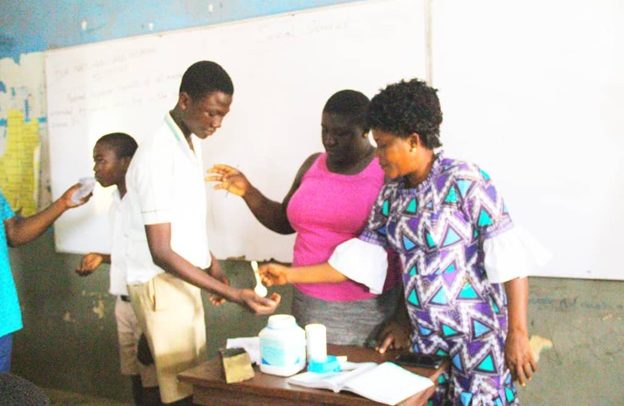Faustina Amissah assisting health officials to administer the drug
A campaign has been launched to deworm more than 24,000 basic school children in Obuasi East in the Ashanti Region.
District Chief Executive (DCE), Faustina Amissah, kicked off the programme last week by giving deworming tablets to some children at the St. Joseph R/C School at Wawase in the district. She said up to 24,000 children and above, aged two to 17, will get the tablets at government schools.
The campaign, launched in collaboration with Obuasi East District Health and Education Directorates, forms part of a comprehensive nationwide deworming exercise in schools. The medicines are administered under strict supervision of teachers to the children at their respective schools with assistance from local health workers.
The DCE encouraged active participation and called on parents and guardians to make their wards available for the deworming exercise. She underscored the importance of the exercise, while emphasising the interconnectedness of community health.
The district Disease Control officer, Solomon Aduhene, reaffirmed the directorate’s commitment to expanding the deworming programme to various schools within the district, citing the necessity for a collaborative effort to enhance school children’s health and well-being.
“The initiative aligns with the government’s broader healthcare goals, particularly in addressing preventable diseases and improving overall public health,” he asserted.
He said deworming exercise would target from Kindergarten pupils to Junior High School students with the goal to address cases of anemia.
The prescribed medications, Praziquantel, for combating Schistosomiasis, and Albendazole for addressing various worm infections, are intended to mitigate anemia and malnutrition among the targeted demographic, he explained.
The District Director of Education, Kwabena Owusu Nketia, also highlighted the importance of annual deworming as a critical practice for both students and individuals.
“This comprehensive approach covers all 26 primary schools and 20 kindergarten schools, with a specific focus on KG 2 and 19 primary schools, excluding private institutions,” he revealed.
By Ernest Kofi Adu


